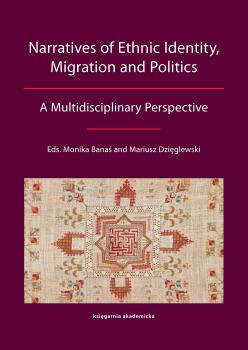Narratives of Ethnic Identity, Migration and Politics: A Multidisciplinary Perspective
Słowa kluczowe:
multiculturalism, migratory policy, Europe, cultural implications of migrationStreszczenie
Ethnicity, as a conceptual category developed by representatives of various scientific disciplines, refers to extensive and complex sets of social and psychological phenomena that take place both in the public and private spheres. On the one hand, it is a very useful analytical instrument, yet, on the other hand, it is a set of features of individuals and communities that can be practically distinguished and that create individual and collective identity, on the basis of such attributes as e.g. language, origin, race, culture or multigenerational traditions. The foundations of ethnicity are very often rooted in deep primordial, conscious elements that constitute a bond based on a real or symbolic relationship, in which individuals that create a community express their belief and approval. A territorial, temporary, historical, ideological or even – when observing current times – economical component very often appears among these elements. The classical presentation of ethnicity is no longer sufficient to describe phenomena that we observe today; it requires supplementation – a subsequent extension of the limits of this concept that is originally associated with a private, almost intimate sphere of consciousness that gives meaning to the life of an individual and a sense of belonging to a community.
from the Preface
Rozdziały
-
TABLE OF CONTENTS
-
Preface. Ethnicity – an Ambiguous Concrete Term? .......... 7
-
CHAPTER ONE. MIGRATORY AND CULTURAL POLICY IN EUROPE
-
Migration Management in the European Union. Immigration Policy in Germany and the United Kingdom .......... 21
-
European Cultural Policy and Multiculturalism (In the Context of the Study of Catholicism in Bulgaria) .......... 35
-
CHAPTER TWO. NATIONALISM AND NATIONAL IDENTITY
-
The Macrosocial Roots of Ethnonationalist Revival. Modes of Narration and Value Confi gurations .......... 47
-
South European Nations Seeking Their Identity on the Turn of Epochs and the Ethno-Anthropological Science .......... 63
-
An Analysis of the Consequences of the Migration of Women-Scientists of Russian Origin in the Period 1965-2008 .......... 71
-
CHAPTER THREE. IDENTITY CONSTRUCTION AND MIGRATION
-
Narratives of Polishness. Identity Ambiguities of Foreign Students of Polish Descent .......... 87
-
Identity Strategies in the Narratives of Second Generation Polish Return Migrants .......... 101
-
One Group – Different Approaches to Identity Construction. Kvens vs. Descendants of Finnish Immigrants in Norway .......... 117
-
CHAPTER FOUR. SOCIO-ECONOMIC AND CULTURAL IMPLICATIONS OF MIGRATION AND RETURN
-
The Economic and Social Implications of Post-Accession Migration from Poland as Depicted in Weekly Magazines .......... 131
-
Skilled Migrant Careers from the East to the West of Europe. Polish Architects and Engineers in Ireland .......... 147
-
The Post-EU Integration, the Migration of the Polish and Intergenerational Relations. The Case of Health Professionals’ Migration from Poland to the United Kingdom .......... 159
-
Labor Migration and Entrepreneurship. The Current Situation and Prospects for Ukraine .......... 173
Downloads
Bibliografia





